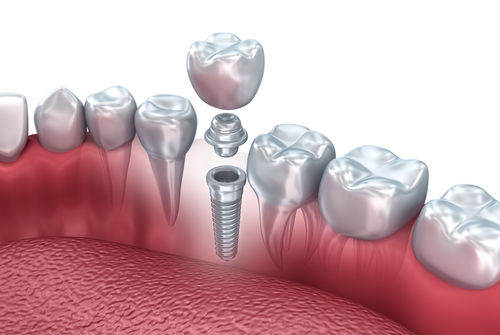Dental crowns are an essential component of restorative dentistry, providing effective treatment for damaged or weakened teeth. Not only do dental crowns restore the functionality of your teeth, but they also help maintain the aesthetics of your smile. Whether you’re looking to repair a broken tooth, protect a weakened tooth from further damage, or cover dental implants, dental crowns offer a versatile solution for various dental issues.
Dental crowns are custom-made “caps” that encase the entire visible portion of a tooth above the gum line, providing strength and support to the damaged tooth and preventing further deterioration. These crowns can be made from a variety of materials, such as porcelain, porcelain-fused-to-metal, zirconia, or metal alloys, depending on the patient’s needs and preferences. Each material offers its own unique set of benefits and drawbacks, which we will explore in more detail further in this article.
With improved materials and advanced dental techniques, dental crowns have become a popular and reliable treatment option for various dental issues, such as fractured or decayed teeth, protection of teeth after root canal therapy, securing dental bridges, or improving the appearance of misshapen or discolored teeth. By offering an in-depth look at dental crowns, our aim is to help you gain a greater understanding of this restorative treatment and enable you to make informed decisions about your dental health. Join us as we explore the fascinating world of dental crowns and their role in creating lasting, healthy smiles.
A Comprehensive Guide to Dental Crowns: Types, Benefits, and Procedure
Types of Dental Crowns
Dental crowns can be crafted from various materials, each with its own advantages and disadvantages. The choice of material for a dental crown usually depends on factors such as the tooth’s location, the patient’s aesthetic preferences, and the financial considerations. Let’s explore the different types of dental crown materials:
1. Porcelain: Porcelain crowns are highly popular due to their ability to mimic the appearance of natural teeth. Porcelain is a durable material that offers excellent stain resistance, making it an ideal choice for front teeth restorations. However, porcelain can be prone to chipping or cracking under extreme pressure, which might make it unsuitable for some cases.
2. Porcelain-fused-to-metal (PFM): PFM crowns offer the best of both worlds by combining the aesthetic appeal of porcelain with the strength of a metal alloy substructure. These crowns are highly durable and look natural, but there can be instances of the metal base becoming visible, especially near the gum line, which may be unsightly for some patients.
3. Zirconia: Zirconia crowns are created from a high-strength ceramic material that is both highly durable and aesthetically pleasing. They can be color-matched to your natural teeth, providing a seamless appearance. Zirconia crowns are an excellent choice for patients seeking an optimal balance between aesthetics and strength.
4. Metal alloys (Gold, silver, and other metals): Metal crowns are usually the most durable dental crown option and are typically used for molar restorations where strength is a priority, and aesthetics are less of a concern. Metal crowns can withstand significant biting force without wearing down. However, their metal appearance may be less appealing to some patients.
The Benefits of Dental Crowns
Dental crowns provide a wide range of benefits, making them an essential treatment option in restorative dentistry. Some of the primary benefits include:
1. Restoration of dental function: Dental crowns can effectively repair fractured or severely decayed teeth, restoring their original shape and function while preventing further damage.
2. Aesthetic improvement: Dental crowns can enhance the appearance of misshapen, discolored, or damaged teeth by providing a natural-looking, attractive restoration.
3. Support for other dental treatments: Dental crowns serve as an integral part of other dental procedures, such as dental bridges or dental implants, by providing a secure and stable support structure.
4. Long-lasting solution: With proper care and maintenance, dental crowns can last for many years, providing a durable and reliable solution for various dental issues.
The Dental Crown Procedure
The process of placing a dental crown typically involves the following steps:
1. Initial consultation and evaluation: During your first visit, your dentist will assess the condition of your tooth to determine if a dental crown is the most suitable option. They may conduct a dental exam and take X-rays to ensure the tooth’s underlying structure is healthy enough to support a crown.
2. Tooth preparation and impression: To accommodate the dental crown, your dentist will carefully remove a portion of the tooth’s enamel and reshape it accordingly. Next, they will take an impression of your tooth using either a dental putty or digital scanner, which will serve as a blueprint for your custom-made dental crown.
3. Temporary crown placement: While your permanent crown is being crafted in a dental lab, your dentist may place a temporary crown to protect the prepared tooth and maintain your dental appearance.
4. Permanent crown placement: Once your permanent dental crown is ready, you will return for a follow-up appointment. Your dentist will remove the temporary crown, clean the tooth, and place the permanent crown, making any necessary adjustments to ensure a perfect fit and bite. The crown is then cemented in place for a long-lasting, secure bond.
Caring for Your Dental Crown
Maintaining your dental crown is essential for prolonging its lifespan and ensuring your oral health. Keep the following tips in mind to care for your dental crown properly:
1. Practice good oral hygiene: Brush your teeth twice a day with fluoride toothpaste, and floss daily to remove plaque and food debris.
2. Attend regular dental check-ups and cleanings: Routine dental visits will enable your dentist to monitor the condition of your dental crown and address any potential issues early on.
3. Avoid biting on hard objects or using your teeth as tools: This can damage your dental crown and natural teeth.
4. Wear a night guard if you suffer from bruxism (teeth grinding) to protect your dental crown and natural teeth from excessive wear.
Conclusion
Dental crowns are a reliable and versatile restorative treatment option that can improve the functionality, appearance, and overall health of your teeth. By understanding the different types of dental crowns, their benefits, and the procedure involved, you can make an informed decision about whether this treatment is right for you.
At Liberia Dental Care in Manassas, VA, our skilled dental professionals are devoted to providing high-quality dental crown restorations to help you achieve the healthy, beautiful smile you deserve. Schedule a consultation with our dentist in Manassas today to discuss your dental crown options and embark on the journey towards optimal oral health.









